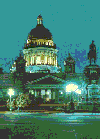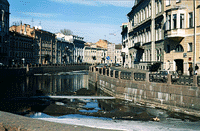

The Neva river is the mother, nursemaid and governess of one of the
Russia's, and the world's greatest cities. The glory of the Russian imperial
capital extended to what, according to geographers and hydrologers, is
the smallest of Europe's major rivers. Yet the shape of the Neva, the size
and the power of its waters have shaped the character of St.Petersburg.

Pearl of NorthWest , Window to Europe, Northern Venice -
just a few of the titles, granted to one of the most beautiful cities on
Earth. Geographically the city is located far in the North, making for
bitter winters with little sun, but also giving it's citizens a summer
that is more like a spring.
"Venice will rise in a north sea. 
The city will emerge from the dead water"
Nostradamus.
St.Petersburg, home to "White Nights" and cradle of Russia's pre-revolutionary aristocracy, is a city of beautiful 19-th century buildings, stately squares and lavish palaces. With a population of more than 5 million it is Russia's second largest city and has retained a strong Western flavour despite its turbulent history.
Among my favorite St.Petersburg's web sites is The Fresh Guide to St.Petersburg (frames), which offers a lot of interesting information about the city. There I found an unusual view at my native city's history (no frames) and I liked it so much that I not only linked to this page, but for cases of slow overseas connection mirrored text-only version on my page.
 For
three weeks in June, St.Petersburg sheds its icy grimness as daylight creeps
towards the midnight hour and the city is transformed by festivals celebrating
the arrival of White Nights. There is a diffusion of jazz and theatrical
festivals to celebrate summer's bloom and St.Petersburgers and visitors
make the most of it as they party into the early hours of the morning,
accompanied by a slight dusky haze.
For
three weeks in June, St.Petersburg sheds its icy grimness as daylight creeps
towards the midnight hour and the city is transformed by festivals celebrating
the arrival of White Nights. There is a diffusion of jazz and theatrical
festivals to celebrate summer's bloom and St.Petersburgers and visitors
make the most of it as they party into the early hours of the morning,
accompanied by a slight dusky haze.
 St.
Petersburg is synonymous with the Hermitage Museum, one of the three greatest
museums in the world, along with the Vatican and the Louvre. Previously
the residence of the Imperial family, the museum consists of three interlinked
buildings — the Winter Palace, the Small Hermitage and the Large Hermitage
— and contains over three million exhibits and one of the best art collections
in the world. The gallery is most famous for its European art and you can
view works by Monet, Cezanne, Renoir, Picasso, da Vinci, Michelangelo,
Rubens and Rembrandt.
St.
Petersburg is synonymous with the Hermitage Museum, one of the three greatest
museums in the world, along with the Vatican and the Louvre. Previously
the residence of the Imperial family, the museum consists of three interlinked
buildings — the Winter Palace, the Small Hermitage and the Large Hermitage
— and contains over three million exhibits and one of the best art collections
in the world. The gallery is most famous for its European art and you can
view works by Monet, Cezanne, Renoir, Picasso, da Vinci, Michelangelo,
Rubens and Rembrandt.
The Winter Palace borders the magnificent 19th-century Palace Square which is dominated by the red-granite Alexander Column, erected to commemorate Russia’s defeat of Napoleon in 1812. The square was also the site of the 1905 Bloody Sunday massacre.
Diagonally across the Neva River from the Hermitage, is the Peter-Paul Fortress, St. Petersburg’s founding building constructed by Peter the Great to provide protection from the Swedes. It was never used for this and became one of Russia’s most notorious prisons. Many famous revolutionaries like Leon Trotsky and Lenin’s elder brother, Alexander, were detained here. After looking at the gloomy prison cells, a must see is the Fortress Cathedral which houses the tombs of most of Russia’s Tsars and Tsarinas from the 18th century onwards, including Peter the Great.
It will never be enough space to tell everything I want about St.Petersburg and as Russians say "Better see it once than hear about it seven times". Just enjoy the view of this magnificent place.
 Rostralny
Columns
Rostralny
Columns  St.Isaacs
Cathedral
St.Isaacs
Cathedral
 Peter
the Great
Peter
the Great  Saviour on the Blood.
Saviour on the Blood.  Summer Garden
Summer Garden
 Griboedov
canal.(No link)
Griboedov
canal.(No link)
| Home | About me | Resume | Matroskin | Friends |